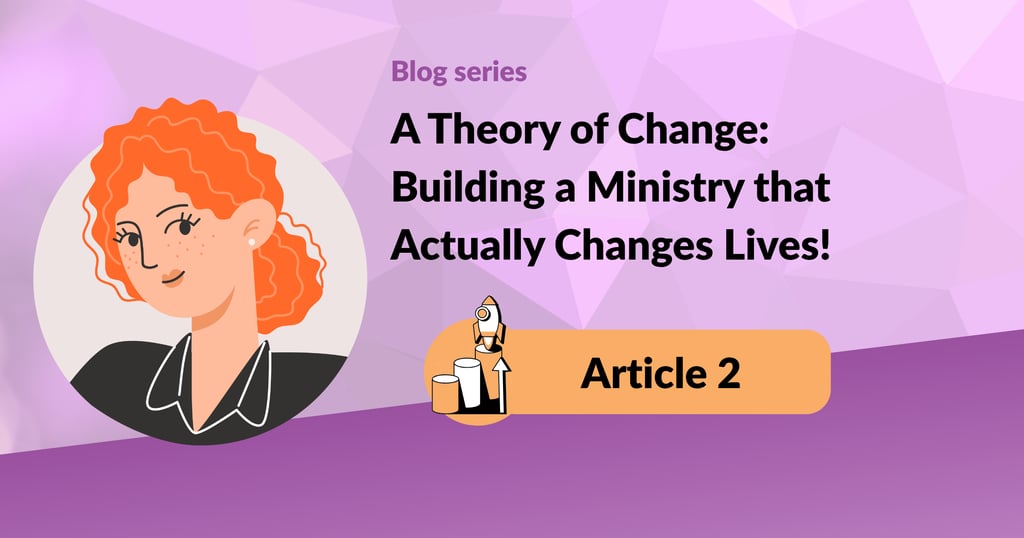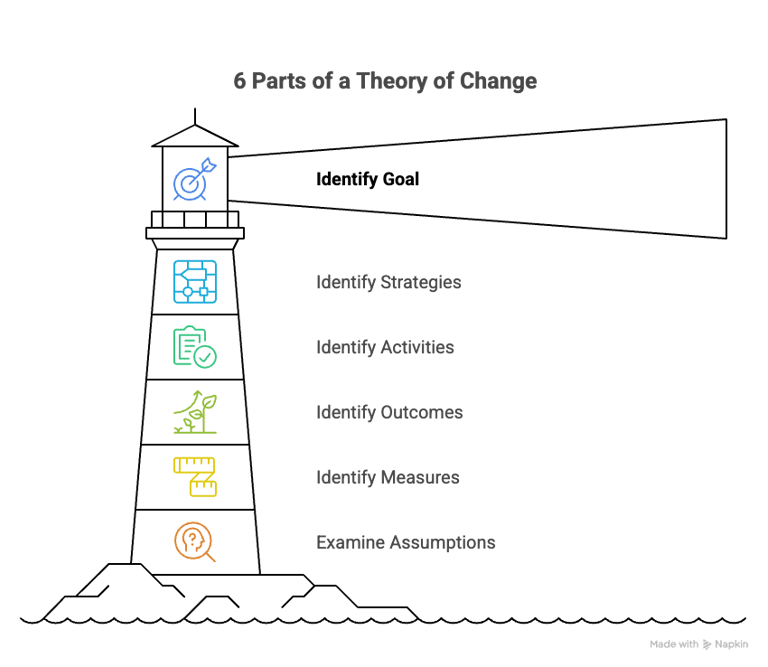2. A Theory of Change: The Engine That Powers Ministry
Brandon Booth
6/9/20255 min read
Never miss a post! Signup for my email updates today and get expert guidance delivered directly to your inbox!
Last week I promised to show you the hidden foundation that determines whether your Theory of Change will actually work. This article and the next one are going to be the most important and valuable in this entire series.
We're not just tweaking your ministry's programs—we're building the engine that powers everything you do: your theory of heart change. But before we dive into the engine itself, let me show you how this engine fits into the larger machine.
The 6 Parts of a Theory of Change
A Theory of Change has six essential parts that work together:
Identify a clear goal to fix a problem - What change are you trying to create? And what are the obstacles preventing that change?
Identify strategies - How will you accomplish your goal?
Identify activities - What specific things will you do while executing your strategies?
Identify outcomes - What change will show you're making progress?
Identify measures of success - How will you know if you are accomplishing your goal?
Examine Assumptions - At every step of the process ask: What beliefs are you operating from? What am I assuming is true? Are these assumptions accurate?


You can probably already see how powerful this is when applied to a specific ministry. And I’m guessing you're itching to get started developing your own Theory of Change. But, please, I encourage you to slow down!
Before you can develop a Theory of Change for your specific ministry, you need to understand the universal “engine” that powers all effective Christian ministry—a theology of heart change. This isn't about your particular programs or context; this is about the fundamental mechanics of how God transforms human hearts.
And one other quick note: the process of developing a Theory of Change isn't linear. You examine assumptions at every step, and new insights often send you back to refine earlier elements. It's more like tuning an engine than following a recipe. You might discover something about your assumptions that completely changes your understanding of the problem, which then reshapes your goals and strategies.
This back-and-forth refinement is actually a feature, not a bug. It's how you develop a theory that actually works in the real world rather than just on paper. So, again, it’s wise to go slow!
The “Engine”: A Christian Theory of Heart Change
In my opinion, here's the theological engine that powers every effective Christian ministry. Please don’t feel obligated to agree with me! Instead, use this as a starting point to explore your own assumptions and theology around transformation.
The core assumption: All Christian ministries, regardless of their specific focus, share a common goal. Whether you're running a food pantry, leading a youth group, or pastoring a church, you're fundamentally in the business of heart transformation.
The engine of change: As theologian Simeon Zahl puts it, "The heart of Christian ministry is facilitating an emotional encounter with God." This isn't about creating emotional manipulation or manufactured experiences. It’s the simple recognition that the human “heart” (emotions and desires) is the engine of our lives. Nothing changes unless our hearts change!
The fundamental challenge: The resistance of the human heart is the core obstacle every Christian ministry must overcome. This isn't just about people being stubborn or set in their ways. It's about something deeper—the way sin has oriented our hearts away from God and toward ourselves.
How the engine works: The Spirit of God traffics in emotion and desire. God doesn't just want to inform our minds; He wants to transform our loves. This means effective ministry must engage the whole person—heart, mind, and body.
This engine maps perfectly onto the Theory of Change framework:
Part one: Identify a clear goal to fix a problem
We're not just trying to modify behavior or increase knowledge. We're seeking to reorient human desires toward God. When someone's heart is truly changed, their actions follow naturally.
But the fallen human heart is resistant to change. Sin fundamental orients us away from God and this affects all aspects of our lives. We don't just need better information or stronger willpower; we need our hearts to be turned toward God.
Part 6: Assumptions:
Following Zahl’s lead (who is following St. Augustine), I have four foundational assumptions about how heart change happens:
Human nature and sin: Humans are fundamentally oriented away from God due to sin. This affects everything—our desires, our reasoning, our relationships. We can't simply think or will our way out of this condition.
Grace as primary agent: Meaningful change comes through God's grace, not human effort. Grace is not something that can be earned or achieved through human effort but is a gift that transforms the individual from within.
Heart as locus of change: True transformation occurs at the level of desires, motivations, and loves. Changing someone's mind or behavior without changing their heart produces temporary results at best.
There are clear technologies of heart change: There are tried and true ways that facilitate emotional encounters with the divine. We don’t need to manufacture experiences, but we can intentionally create space for God to meet people in transformative ways.
The idea that hearts (not thoughts or behavior) are what need to change set’s Christian ministry apart from secular social work or education. We're not just trying to solve problems or transfer information—we're facilitating encounters with God! And God can totally transform our loves and desires.
Your Next Step
Begin examining your own theological engine. This is philosophical work, not practical planning. Take time to think deeply about these foundational questions:
Reflection Questions:
When you think about the most profound spiritual transformation you've witnessed, what actually caused it—information, experience, or something else entirely? Really think about this. Was it a sermon, a conversation, a moment of worship, a crisis that led to prayer? What was happening at the heart level?
Which of the four assumptions resonates most strongly with your experience? Which one challenges you the most? Be honest about where you might have unconscious disagreements with this framework. Those disagreements are valuable data about your own theological engine.
Theological Exercise:
Write a paragraph completing this sentence: "I believe people's hearts change when..." Don't think about programs or methods yet—focus on the fundamental mechanics of transformation as you understand them. What do you really believe about how God works in human hearts?
This exercise might feel abstract, but it's crucial. Your answers to these questions are already shaping every decision you make in ministry, whether you realize it or not. Making them explicit gives you the power to examine and refine them.
What's Next
Understanding these four assumptions gives you the foundation, but there are deeper theological insights that will completely reshape how you think about ministry effectiveness.
In the next article, I'll unpack the specific theological assumptions and key strategies that make heart change possible—insights that most ministries never consider but that make all the difference between ministries that truly transform lives and those that just keep people busy.
Ready to examine your ministry's theological engine? I'd love to help you think through these foundational questions and how they apply to your specific context. Every ministry leader needs to wrestle with these deep questions, and sometimes it helps to have someone walk alongside you in the process. Schedule a free 30-minute conversation with me, and let's explore how these insights can strengthen your ministry's foundation.
-------------------
This is the second article in our series "A Theory of Change: Building a Ministry that Actually Changes Lives!" ← See the previous article, or check out the next article here →


Let's build!
Connect with me today and let's start building your ministry that will change lives!
© Brandon Booth, 2025
Expert guidance for nonprofits and ministries.
Brandon Booth



